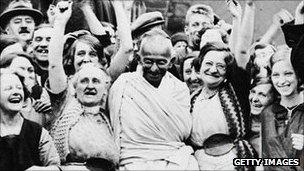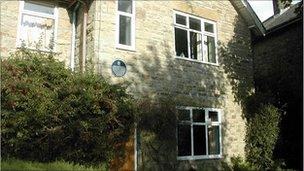When Gandhi met Darwen's mill workers
- Published

Gandhi met with weavers from Greenfield Mill during his visit
It is almost 80 years since the cotton town of Darwen in Lancashire played host for a night to one of the most famous men in the world, Mohandas Karamchand Gandhi, who led the Indian campaign for independence from Great Britain.
Gandhi visited the town after accepting an invitation from the mill-owning Davies family.
They wanted him to see for himself the hardship being suffered by the East Lancashire textile industry, which had been decimated by the Indian independence movement's boycott of British goods.
Darwen local historian Harold Heys said: "The Davies family were prominent Socialists and Quakers, and they firmly believed that the Mahatma might understand the suffering through mill towns such as Bolton, Oldham, Burnley and Blackburn.
Hospitality and friendship
"They believed that they might be able to influence him and his passive resistance campaign as he fought for Indian independence from Britain."
Gandhi, who was then 62-years-old, was in London for a round table conference on India's future.
Mr Heys said: "It was big news, but talks had stalled and the press was losing interest.
"He needed to get away from meetings and politics and lobbying and the invitation from Percy Davies, later the first Lord Darwen, came just at the right time."
Gandhi and his small entourage travelled north and arrived at Spring Vale station, on the outskirts of Darwen, late on the Friday night of 25 September, 1931.
Trouble had been expected, but he received a warm welcome from the locals.
Gusta Green was 10 years old in 1931 and remembers meeting Gandhi.
She said: "My father said I want you to see Gandhi, then in the future you can say that you witnessed that brave man.
"I stood by this door into the works and that was my first sighting of Gandhi. He looked down at me, stroked my hair, grinned and walked away. He never said one single word.

The house in Garden Village where Gandhi stayed now has a blue plaque
"I was told subsequently that he loved children, well the way he handled me, I can believe that."
Gandhi's sympathies lay with the workers, not the textile manufacturers. He said: "They treated me as one of their own. I shall never forget that."
Mr Heys continued: "Gandhi met mill workers and mill owners and civic dignitaries and was most polite as he explained the problems he faced at home.
"But he looked round at the smart houses of Garden Village which the Davies family had built for the workers and couldn't quite square it all with the poverty of his own country."
He stayed the Friday night at 3 Garden Village, the terraced home of Charles Haworth, and on the Saturday he stayed with the Davies family at their farm near Clitheroe.
On the Sunday morning the world's press gathered there to hear him talk of India's fight for self-rule and how he could promise little support for British industry and especially the Lancashire textile workers.
The boycott would stay unless there was progress towards independence, he told them.
It took nearly 20 years and another world war before India finally achieved self-rule and by that time the East Lancashire textile industry was in a steady decline.
Some of the old weavers had tried to tell him how bad things were on his visit to Darwen. He simply replied: "My dear, you have no idea what poverty is."